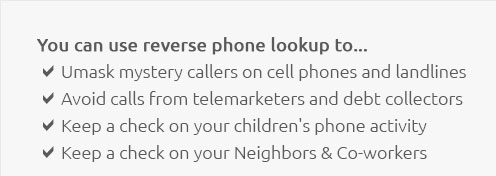 |
 |
 |
|---|
 |
 |
|---|---|
|
|
 |
|
|---|---|
 |
 |
 |
 |
 |
 |
|---|---|
 |
|
Understanding US Reverse Phone Lookup: A Comprehensive GuideThe concept of reverse phone lookup has gained considerable traction in the United States, offering individuals the ability to trace the origin of a mysterious number that might appear on their phone. Reverse phone lookup can be an incredibly useful tool, yet it's essential to approach it with a well-informed perspective to maximize its benefits and avoid potential pitfalls. This article delves into the nuances of reverse phone lookup, providing insights into how it works, its applications, and common mistakes to avoid. Firstly, let's explore how reverse phone lookup works. Essentially, it involves using a phone number to identify the person or business associated with that number. Many online services offer reverse phone lookup capabilities, ranging from free platforms to premium services that provide more detailed information. The process typically involves entering the number in question into a search bar, after which the service attempts to match the number to a name or business in its database. One of the most significant applications of reverse phone lookup is in identifying unknown callers. This can be particularly useful in situations where you've missed a call and are unsure whether it's worth returning. Additionally, businesses might employ reverse phone lookup to verify customer information or to prevent fraudulent activities. However, it's crucial to recognize that the effectiveness of these services can vary significantly, as not all numbers are listed in publicly accessible databases. As with any tool, it's important to use reverse phone lookup responsibly. One common mistake is relying too heavily on free services, which may not provide accurate or up-to-date information. These services often have limited databases and might not cover unlisted or cell phone numbers. Therefore, opting for a reputable paid service can sometimes offer more reliable results. Another pitfall to avoid is disregarding privacy considerations. While reverse phone lookup can offer valuable insights, it's essential to respect privacy laws and use the information obtained ethically. Misusing personal information can lead to legal repercussions, so it's imperative to understand the boundaries of lawful use. Moreover, users should be wary of potential scams. Some websites might promise comprehensive information for a fee but fail to deliver accurate results. Conducting due diligence by reading reviews and checking the credibility of the service provider is advisable before making any payments. In conclusion, reverse phone lookup is a powerful tool with numerous applications, but like any resource, it requires careful and informed use. By understanding how these services operate, choosing the right provider, and respecting privacy norms, users can effectively leverage reverse phone lookup to meet their needs without falling prey to common mistakes. As technology continues to evolve, staying informed about best practices in using such services is crucial for maintaining both security and privacy. https://apps.apple.com/us/app/reverse-lookup/id1086846780
Reverse Lookup is a FREE reverse phone lookup app for iOS devices that retrieves all available information associated with a phone number. https://www.quora.com/What-is-a-reverse-phone-lookup-Does-Google-have-a-reverse-phone-lookup-If-not-what-apps-are-there-that-do-the-same-thing
Are there any totally free reverse phone lookup services for cell phones in the US? There are many phone lookup services, but not all are ... https://www.numlookup.com/
NumLookup can be used to perform a completely free reverse phone lookup for any US phone number. Simply enter the phone number in the form below and click on ...
|
|---|